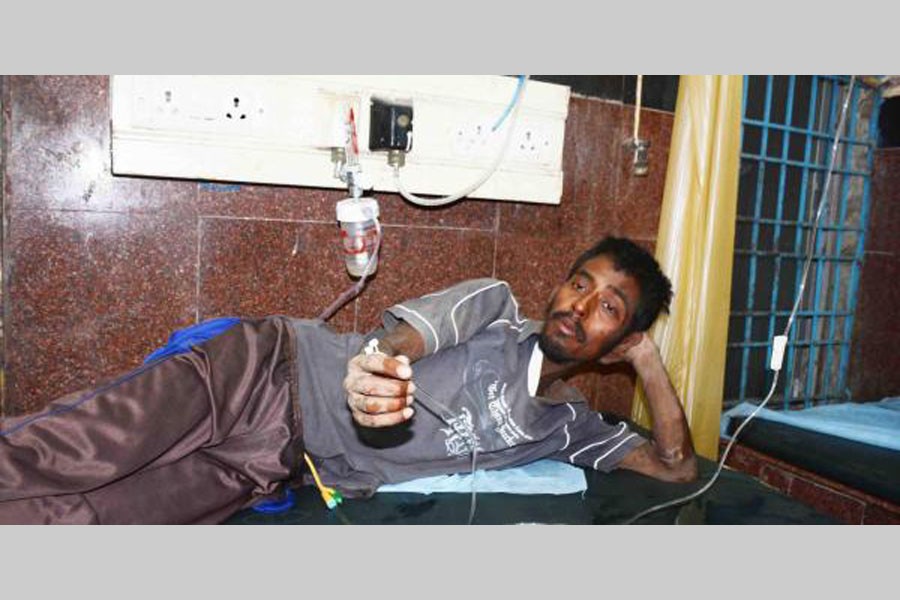That physicians of hospitals and clinics situated in outlying upazilas stay away most of the time is widely known. But they also play truant from government health facilities in the capital and district-level ones is hardly common knowledge. A drive launched by the Anti-Corruption Commission (ACC) in 11 hospitals of eight districts including the capital has revealed that as many as 92 out of 230 doctors were absent from duty. On the day of the drive, therefore, 40 per cent physicians remained absent. The proportion of absenteeism was much higher at 62 per cent among those at the upazila hospitals of the seven districts under review.
There is a pleasant surprise though. Mugda General Hospital came out in flying colours. It was the only health facility to record cent per cent presence of physicians. When a hospital can ensure attendance of all the on-duty doctors, there is no doubt that the administration is what it should be. But then the hospital's image was dented somewhat when the ACC team caught a medical stretcher-bearer red-handed at the time of accepting speed money from a patient's near and dear ones.
Physicians' is a noble profession. The Hippocratic Oath they take was supposed to be held sacred but now the practice most doctors are engaged in is simply a mockery of it. It has been reduced to an outsize hypocrisy. How can on-duty physicians stay away and continue private practice when patients requiring their attention wait and then have to return disappointed or seek medical attention in private chamber of a doctor?
Those who have had the privilege to study medical science at a government medical college should not be unaware of the fact that the cost they had to bear was only a fraction of the actual expenditure of medical education. It was the public money that helped subsidise their education. Now is the time for the doctors to return some of the debt to the countrymen, the poor in particular. Instead, it is the wretched at the bottom of social structure, who are neglected most. Because they cannot buy medical treatment and have no influence or a VIP to recommend them, they are turned back without treatment.
Ideally, physicians employed in a hospital were not supposed to do private practice. But this cannot be maintained for a number of practical reasons. Yet commercialisation of private practice has been pushed too far to the extent where it really stinks and does a disservice to the medical profession. There is no harm in building a career but unless physicians know how much is too much and where they should draw a line, the profession is likely to lose image. This exactly has been the case with most of the consultants who hardly pay enough attention to their patients. How can one justify medical attention to 50 to 80 patients in one sitting?
It is the lure of lucre that really has prompted reputed consultants to go full-throttled commercial. They may argue that their service is in so high demand that patients queue before their chambers. This may be true but only partly; because experienced and high-calibre doctors should not only treat patients but also teach the trade to their juniors so that they can take over from them. In a race for money-making, ethics and principles of medical service become a casualty.
Its negative influences are carried down the ranks and the junior physicians posted at a health facility in upazila consider that their prospect of career building has come to a dead end. Sure enough, bright young medical professionals should have ambitions. But most of the upazila hospitals lack the required medical facilities such as machines and equipment. In some cases there may be some basic apparatuses but operators of those are not recruited. Reports on costly medical equipment becoming thus disused are plenty.
So here is an area that needs to be addressed on a priority basis. Rotational appointment of fresh medical graduates to upazila/district and city hospitals can be an answer to the problem of long-term service at outlying health facilities. But at no point should physicians be allowed the undue advantage of remaining absent from duty and visiting the hospital once or twice a week or month to draw salary. This is criminal. Not only is a physician resorting to a cheating practice but also depriving patients of their right to treatment.
If someone thinks jobs in upazila hospitals are not worth his/her calibre or effort, better it would be to quit the service. One is at liberty to start private practice but this cannot be at the expense of duty in government health facilities. The same should be applied to eminent consultants if they avoid hospital duty in favour of private practice.
It is not for nothing that the system of medical service in the country has earned enough disrepute. Why do patients feel ill at ease to visit a hospital or a doctor's chamber here? They go to India or Singapore or Thailand instead and are satisfied with the treatment they receive. Doctors here, by no means, are of below standard. The difference is in the mind-set. Doctors in those countries pay as much attention as is required but the same is not true here. Except a handful of rare breed, the majority of physicians here need some soul-searching before they complain against patients going abroad for treatment.


